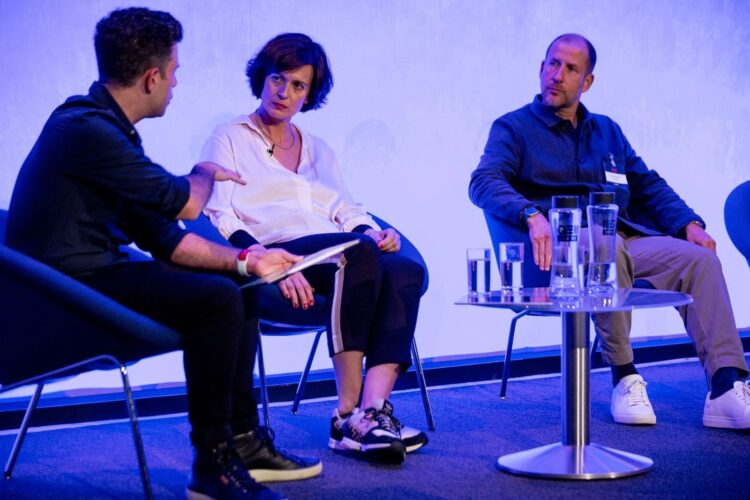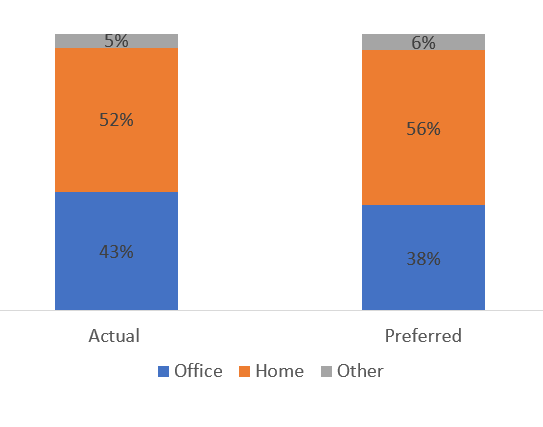Hybrid working: why media leaders need to ‘inspire the collective’

At the All In Summit, The Media Leader‘s editor Omar Oakes discussed the future of the workplace and the impact of hybrid working on company culture, creativity and mental health with media leaders from Channel 4 and WPP’s media-buying arm GroupM.
The team ethic in media and advertising companies needs to be “rekindled” as hybrid working develops beyond the pandemic, the industry’s All In Summit heard during a panel with media leaders from GroupM and Channel 4.
Speaking to The Media Leader‘s editor Omar Oakes, Channel 4’s chief revenue officer Veriça Djurdjevic revealed how the broadcaster was trying to encourage a sense of responsibilities to other teammates and the sense of the collective.
It comes after Channel 4 staff were told last week that they will, later this year, be asked to come into the office for a majority of the working week, with most staff having worked two days a week in Leeds or London since Covid-19 social distancing measures wound down last year. GroupM is taking a similar approach this year.
Djurdjevic explained: “There is within this the desire to belong to something greater than ourselves being a driver that actually somehow connects and gives meaning has just become much harder to galvanise over this period, and so some of what we’re trying to do really is actually a really intangible thing, which is to make people rekindle that sense for themselves, and you can’t do that unless you have a framework to make sure that the majority are there on the same days which is difficult.”
GroupM EMEA & UK CEO Josh Krichefski (also the recently-appointed IPA president) suggested “guardrails” or “frameworks” like core hours or common days for teams to go in was a positive thing.
He highlighted culture was critical to workplace success and the key thing was how to make it worthwhile for people to come into the office.
Krichefski said: “The more we listen, and empathise the better, and I think the more we’re together, the better as well.”
Moves to get people ‘back in’ has brought ‘whole series of tensions’
The second annual All In Census of nearly 19,000 advertising professionals polled attitudes towards hybrid working, and found that on average employees would prefer to spend more of their working week at home compared to in the office.
The Census found employees ideally would want to work 38% of the time in the office, 56% of the time at home, and 6% in another location. Whereas actual working time was split 43% in the office, 52% at home and 5% elsewhere.

Both GroupM and Channel 4 will be moving to a model over the course of 2023 where the majority of employees’ time must be spent in the office.
On the subject of changing rules around spending more time in the office, Djurdjevic said the question prompted “a whole series of tensions” which means these are not easy choices for leaders, organisations or teams to make.
She said it was hard to move from “ultimate flexibility and control” to then have a feeling that this is being “taken away” to some degree.
Djurdjevic explained: “As leaders we do not feel any different to anyone else — you feel exactly the same about it. You don’t really like necessarily now being told how I should operate, but equally if we don’t put some framework around it that allows for that reconnection then you have this haphazard piece where no one is satisfied with any of the outcomes.”
Krichefski said the industry was at the beginning of a learning journey with hybrid working.
He said: “It’s such a tricky subject is because we don’t really know what perfection looks like and it’s not binary. But there is definitely a sense that the benefits of being together more outweigh the drawbacks.”
“Unless we can create workplaces that are magnetic to our people, and really make them want to spend time with each other, we can’t really make hybrid working work,” he clarified.
‘Completely different rulebook’ needed
Krichefski later revealed that he had been “preaching” about flexible working not just since the pandemic when it was forced upon much of the working population, but a decade ago when he started in his role as UK CEO at EssenceMediacom.
It was the first policy he put in place and the idea was that everyone should be able to feel they can work wherever they want, whenever they want as long as they get the job done. The one thing he asked for was that people do not email each other after 7pm in the evening or on the weekends to respect other people’s working patterns. However, for the first 18 months he said middle management effectively “ignored” what he said.
Both agreed that leaders have responsibilities around hybrid working, but that this was not about “policing” new guidelines but creating culture.
While Krichefski said sometimes leaders have to make decisions that might not be deemed popular, they are doing it as they have a responsibility to try to create brilliant cultures for employees.
He added that the companies that have been the most responsible through the pandemic, whether through hiring people or letting people go, have thought about how to keep people and how to make the decision.
“The other piece that has been hugely underestimated, and there’s no research on it, and we won’t see it until much in the rear view mirror, is the impact on actually how people feel about the organisation that they work in as a result of viewing it through a screen,” Djurdjevic added.
Djurdjevic stressed that for younger people, or those with less experience or who are new to organisation, it is really difficult to understand what the job is in any industry if you are not learning by osmosis. She recounted how she joined Channel 4 in December 2020 and worked her first nine months from her dining room table.
She said this was “the most anxious time of my working life” akin to walking into a card game in the middle of the game and having to work out the rules and play the hand at the same time.
Djurdjevic said “a completely different rulebook” for how leaders and managers lead and manage teams was needed for hybrid working and providing employees with “a valuable experience”.
They both also mentioned that a lot of conversations around working from home were focussed on a personal individual experience.
Krichefski said: “I think that too much of the time, people say you know, what’s in it for me? Why should I? And, actually, I think culture doesn’t just come from the top. The top have a responsibility in culture, but we all create culture in our businesses.
“We all have a responsibility to stimulate a really creative and inspiring culture. Everyone in this room has that and everyone in all of our workforces. And I think it’s very difficult to do that if we don’t spend time together.”
Neither wanted a return to how things were before the pandemic, but wanted to ensure everyone should be empowered to help create a culture they want to be part of.
Krichefski also said that a culture where people can do amazing work, can spend great time together and enjoy might look different in 12 months’ time compared to now, and it would require listening to employees, assessing and moving forward.
For example, GroupM will be moving into a new office on the South Bank in a year’s time and that the office design has changed to create more interesting collaboration spaces to make it a nicer place to spend time.



